Golden Retriever owners often find themselves concerned when their beloved companion’s stomach feels unusually firm or distended. When a dogs stomach hard condition develops, it can range from a minor digestive issue to a life-threatening emergency requiring immediate veterinary intervention. Understanding the difference between normal post-meal firmness and dangerous abdominal distension could save a Golden Retriever’s life.
This comprehensive guide explores everything Golden Retriever owners need to know about hard stomach conditions, from recognizing early warning signs to implementing prevention strategies. Whether dealing with a situation where my dogs stomach is hard but acting normal or facing an obvious emergency, this resource provides the knowledge needed to make informed decisions about a beloved pet’s Health and safety.
Contents
- 1 Understanding When Your Dogs Stomach Hard Becomes a Medical Emergency
- 2 Why Is My Dogs Stomach Hard: Common Causes in Golden Retrievers
- 3 My Dogs Stomach Is Hard But Acting Normal: When to Worry
- 4 Signs of a Flipped Stomach in Dogs: Golden Retriever-Specific Symptoms
- 5 How to Prevent a Twisted Stomach in Dogs: Golden Retriever Care Guide
- 6 Emergency Response When Your Dog Tummy Hard
- 7 Long-term Management Strategies
- 7.1 When to Consult Your Veterinarian About a Hard Dog’s Stomach
- 7.2 Why is my dogs stomach hard after eating?
- 7.3 What should I do if my dogs stomach is hard but acting normal?
- 7.4 How can I tell if my dog tummy hard is an emergency?
- 7.5 Can I prevent my Golden Retriever from getting bloat?
- 7.6 How quickly does bloat progress in Golden Retrievers?
- 7.7 What is the difference between bloat and GDV in dogs?
- 7.8 Should I try to make my dog vomit if their stomach is hard?
- 7.9 Are Golden Retrievers more prone to stomach issues than other breeds?
- 8 Final Thoughts: Protecting Your Golden Retriever from Serious Stomach Issues
Understanding When Your Dogs Stomach Hard Becomes a Medical Emergency
Golden Retrievers, like many large dog breeds, face unique risks when it comes to abdominal health issues. Recognizing when a hard stomach crosses the line from normal to concerning requires understanding both typical digestive patterns and dangerous warning signs that demand immediate action.
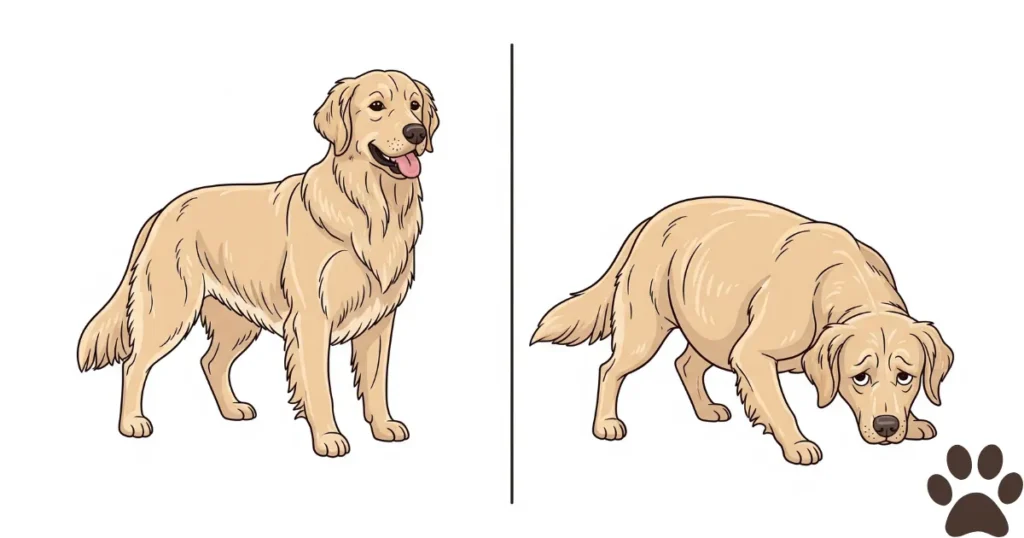
Recognizing Normal vs. Abnormal Stomach Firmness in Golden Retrievers
After a hearty meal, many Golden Retrievers will naturally have a slightly firmer abdomen as their stomach expands to accommodate food and water. This normal post-meal firmness typically feels similar to a full balloon, present but not rock-hard or painful to gentle touch. When owners wonder why is my dogs stomach hard after meals, this natural expansion usually resolves within 2-3 hours as digestion progresses and stomach contents move into the intestines.
Normal stomach firmness in Golden Retrievers usually occurs without accompanying behavioral changes. Dogs continue their regular activities, maintain normal breathing patterns, and show interest in their surroundings. The distended abdomen dog appearance remains proportional, without the dramatic swelling that characterizes serious conditions like GDV in dogs.
However, abnormal firmness presents differently. When Golden Retriever stomach issues develop into serious conditions, the abdomen becomes rigid like a drum, often accompanied by visible swelling that makes the dog appear barrel-shaped. This hardness persists regardless of time since the last meal and continues to worsen rather than gradually improving. Many owners describe this as their dogs stomach hard beyond what seems normal.
Critical Signs That Require Immediate Veterinary Attention
When a distended belly dog condition develops alongside certain symptoms, Golden Retriever owners must recognize these as veterinary emergencies. The most serious concern involves GDV in dogs, where the stomach fills with gas and potentially twists, cutting off the blood supply and creating a life-threatening situation within hours.
Emergency symptoms accompanying a hard stomach include excessive drooling, repeated attempts to vomit that produce nothing, extreme restlessness where the dog can not find a comfortable position, and rapid or labored breathing. Golden Retrievers experiencing Golden Retriever bloat often assume a “prayer position” with their front end lowered and rear end elevated, attempting to relieve abdominal pressure.
Additional critical signs include pale or blue gums, weakness, collapse, and a distended abdomen that sounds hollow when gently tapped. These symptoms indicate that the situation has progressed beyond simple digestive upset and requires emergency intervention to prevent fatal complications.
Why Is My Dogs Stomach Hard: Common Causes in Golden Retrievers
Understanding the various conditions that can cause stomach hardness helps Golden Retriever owners make informed decisions about their pet’s care. When evaluating why is my dogs stomach hard, it’s important to consider both immediate and underlying causes. While some causes are manageable at home, others require immediate professional intervention to prevent serious complications or death.
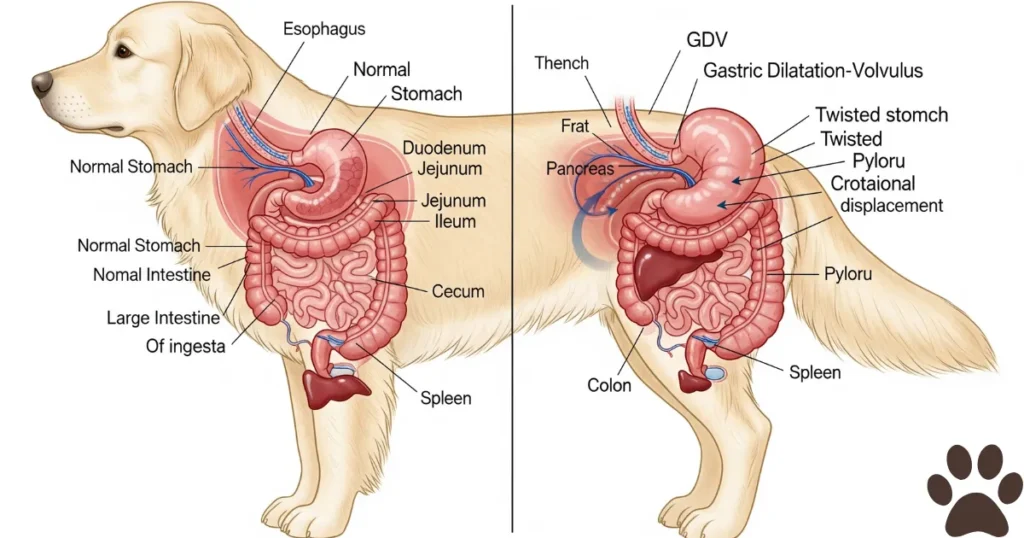
Gastric Dilatation-Volvulus (GDV) – The Most Serious Cause
Gastric Dilatation-Volvulus represents the most dangerous cause of dogs stomach hard conditions, particularly affecting large, deep-chested breeds like Golden Retrievers. This condition begins when the stomach rapidly fills with gas, food, or liquid, causing dangerous distension. In many cases, the expanded stomach then rotates or twists, creating a twisted stomach in dogs scenario that traps contents and cuts off blood circulation.
The dog’s stomach flipping process typically occurs in two stages. Initially, gastric dilatation causes the stomach to expand significantly, creating pressure against surrounding organs and blood vessels. If the condition progresses to volvulus, the stomach rotates along its axis, effectively sealing both the entrance from the esophagus and exit to the small intestine.
Golden Retriever bloat susceptibility stems from their breed characteristics, including deep chest structure, large size, and tendency toward rapid eating. Research indicates that Golden Retrievers face an elevated risk compared to smaller breeds, with factors like genetics, eating habits, and stress levels contributing to GDV development. The condition progresses rapidly, often becoming fatal within 6 hours without emergency surgical intervention.
Other Medical Conditions Causing Hard Dog Tummy
Beyond GDV in dogs, several other conditions can create a dog tummy hard situation in Golden Retrievers. Gastritis, or stomach inflammation, can cause abdominal tenderness and firmness, though typically without the severe distension seen in bloat cases. This condition often results from dietary indiscretion, stress, or underlying health issues.
Intestinal blockages represent another serious cause of distended abdomen in dogs. Golden Retrievers, known for their tendency to consume inappropriate items, may develop obstructions from toys, bones, or foreign objects. These blockages prevent normal digestion and elimination, causing progressive abdominal distension and discomfort.
Less common but serious causes include abdominal tumors, severe constipation, and pregnancy in unspayed females. Golden Retriever health problems may also include liver disease, kidney issues, or heart conditions that cause fluid accumulation in the abdomen, creating firmness without the gas distension typical of bloat. In these cases, owners may notice their dog tummy hard but without the acute emergency symptoms of GDV.
My Dogs Stomach Is Hard But Acting Normal: When to Worry
One of the most challenging situations for Golden Retriever owners involves recognizing serious conditions when their pet appears relatively normal. This “my dogs stomach is hard but acting normal” describes a common scenario where early-stage problems haven’t yet produced obvious behavioral changes.
Early Warning Signs in Golden Retrievers
Golden Retrievers experiencing early-stage abdominal issues may continue normal activities while showing subtle changes that attentive owners can recognize. These dogs might eat their meals but show less enthusiasm than usual, or they may eat normally but seem slightly uncomfortable afterward. When my dogs stomach is hard but acting normal, this often represents the early stages before obvious distress develops.
Behavioral changes during early stages include decreased playfulness, reluctance to lie down in normal positions, or preference for hard surfaces over soft bedding. Some Golden Retrievers begin pacing or seem unable to settle comfortably, though they may still respond to commands and show interest in their surroundings.
Physical changes accompany these behavioral shifts. The abdomen may feel firmer than normal but not yet rigid. Some dogs develop a swollen belly with no pain condition where distension is visible, but the pet doesn’t yet show signs of severe discomfort. These early warning signs provide a crucial window for intervention before the condition becomes life-threatening.
Progressive Symptoms and Dog Bloat Timeline
Understanding the dog bloat timeline helps Golden Retriever owners recognize when a seemingly manageable situation is becoming dangerous. The progression from mild discomfort to life-threatening emergency can occur within hours, making early recognition and intervention crucial for successful outcomes.
During the first 1-2 hours, Golden Retrievers may show subtle signs like reduced appetite, mild restlessness, or slight abdominal firmness. Owners often describe this phase as my dogs stomach is hard but acting normal, where changes are noticeable but the pet seems relatively comfortable. This early recognition window is crucial for successful intervention.
Hours 2-4 typically bring more obvious symptoms as the condition progresses. The distended belly dog appearance becomes more pronounced, and behavioral changes intensify. Dogs may begin showing obvious discomfort, attempting to vomit without success, or demonstrating increased restlessness and inability to find comfortable positions. At this stage, the question of why is my dogs stomach hard becomes more urgent.
Beyond 4-6 hours, the situation becomes critical. Without intervention, shock symptoms develop, including weakness, pale gums, rapid heart rate, and potential collapse. This timeline emphasizes why early recognition and immediate veterinary care are essential when Golden Retriever owners notice persistent stomach hardness.
Signs of a Flipped Stomach in Dogs: Golden Retriever-Specific Symptoms
Recognizing signs of a flipped stomach in dogs requires understanding how this condition specifically affects Golden Retrievers. The breed’s size, temperament, and physical characteristics influence how symptoms present, making it essential for owners to understand breed-specific manifestations of this emergency condition.

Physical Signs of Twisted Stomach in Dogs
When a twisted stomach in dogs develops in Golden Retrievers, the physical changes become increasingly obvious as the condition progresses. The most notable sign involves dramatic abdominal distension that gives the dog a barrel-shaped appearance. Unlike normal post-meal fullness, this distended abdomen dog condition creates a tight, drum-like feeling when gently touched.
The dog’s stomach flipping process affects the entire abdominal region, often making the area behind the rib cage appear swollen and protruding. Golden Retrievers with GDV in dogs typically can not vomit successfully despite obvious attempts, producing only small amounts of foam or saliva. This unproductive retching represents one of the most reliable indicators of stomach twisting, distinguishing it from situations where dog tummy hard symptoms have less serious causes.
Additional physical signs include rapid, shallow breathing as the expanded stomach presses against the diaphragm, making normal breathing difficult. The distended belly dog appearance may be accompanied by pale or bluish gums, indicating reduced blood circulation. Some Golden Retrievers develop a hunched posture as they attempt to relieve abdominal pressure and discomfort.
Behavioral Changes During Stomach Twisting Episodes
Golden Retrievers experiencing twisted stomach in dogs episodes demonstrate characteristic behavioral changes that distinguish this emergency from less serious conditions. The breed’s typically calm and friendly demeanor changes dramatically as dogs become increasingly agitated and unable to find relief from their discomfort.
Extreme restlessness represents one of the most common behavioral signs of GDV in dogs. Golden Retrievers may pace continuously, unable to lie down or stay in one position for more than a few moments. They often assume the characteristic “prayer position” with front legs extended and rear end elevated, attempting to stretch their abdomen and relieve pressure.
As the condition progresses, Golden Retriever bloat causes increasing distress that may manifest as whining, panting, or seeking constant attention from their owners. Some dogs become withdrawn and hide, while others become clingy and follow their owners everywhere. The normal Golden Retriever enthusiasm for activities like walks or treats disappears as the condition worsens and pain increases.
How to Prevent a Twisted Stomach in Dogs: Golden Retriever Care Guide
Prevention strategies for Golden Retriever stomach issues focus on managing risk factors that contribute to bloat and GDV development. While some risk factors like genetics and breed predisposition can not be changed, many environmental and management factors can be modified to significantly reduce the likelihood of developing these serious conditions.
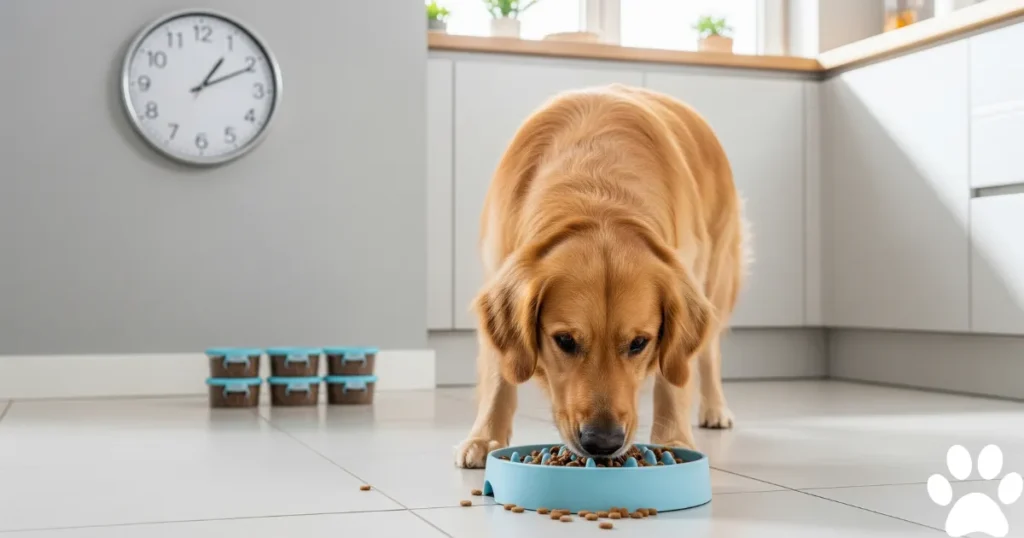
Feeding Strategies to Reduce Bloat Risk
Proper feeding management represents the most important factor in how to prevent twisted stomach in dogs, particularly for Golden Retrievers with their known susceptibility to bloat. Dividing daily food portions into two or three smaller meals rather than one large feeding reduces the risk of rapid stomach distension that can trigger GDV in dogs.
Elevated feeding bowls, once thought to help prevent bloat, are now recognized as potentially increasing the risk for some dogs. Golden Retriever owners should feed their pets from ground-level bowls to encourage a more natural eating posture. Additionally, using puzzle feeders or slow-feeding bowls helps prevent the rapid consumption that contributes to Golden Retriever stomach issues.
Water management also plays a crucial role in prevention. While dogs need constant access to fresh water, limiting large volumes of water consumption immediately before and after meals can reduce bloat risk. Some veterinarians recommend waiting 30 minutes after feeding before allowing unrestricted water access, though dogs should never be denied water for extended periods.
Food type and quality influence bloat risk as well. High-quality, easily digestible foods with moderate protein and fat levels are generally recommended. Avoiding foods high in citric acid or those that tend to produce excessive gas can help reduce the likelihood of dogs stomach hard conditions developing after meals.
Exercise and Activity Management
Exercise timing represents a critical component of Golden Retriever health problems prevention, particularly regarding bloat and stomach twisting. The most important rule involves avoiding vigorous exercise for at least one hour before meals and two hours after eating. This waiting period allows the stomach to empty sufficiently to reduce the risk of twisting during physical activity.
Golden Retrievers, known for their high energy levels and love of activity, require careful management around meal times. Swimming, running, and vigorous play should be avoided during these critical periods. However, gentle walking is generally acceptable and may even aid digestion when performed at least 30 minutes after eating.
Stress management also influences dogs stomach hard prevention, as anxiety and excitement can contribute to rapid eating and increased bloat risk. Maintaining calm, consistent feeding routines and minimizing stressful situations around meal times helps create an environment less conducive to GDV development.
Prophylactic Gastropexy for High-Risk Golden Retrievers
For Golden Retrievers at particularly high risk of developing twisted stomach in dogs conditions, prophylactic gastropexy offers a surgical prevention option. This procedure involves permanently attaching the stomach to the abdominal wall, preventing the rotation that characterizes GDV while still allowing normal gastric dilatation to occur.
Veterinarians often recommend prophylactic gastropexy for Golden Retrievers with a family history of bloat, those who have experienced previous episodes of gastric dilatation without volvulus, or dogs whose lifestyle or temperament creates elevated risk factors. The procedure can be performed during routine spay or neuter surgeries, making it a cost-effective prevention strategy.
Preventing twisted stomach in dogs through gastropexy doesn’t eliminate all bloat risk, as gastric dilatation can still occur. However, it prevents the life-threatening stomach rotation that makes GDV in dogs so dangerous. Recovery from prophylactic gastropexy typically takes 2-3 weeks, with most Golden Retrievers returning to normal activity levels without long-term complications.
Emergency Response When Your Dog Tummy Hard
When faced with a dog tummy hard emergency situation, Golden Retriever owners must act quickly while avoiding actions that could worsen the condition. Understanding proper emergency response procedures can mean the difference between life and death during the critical hours when GDV in dogs develops.
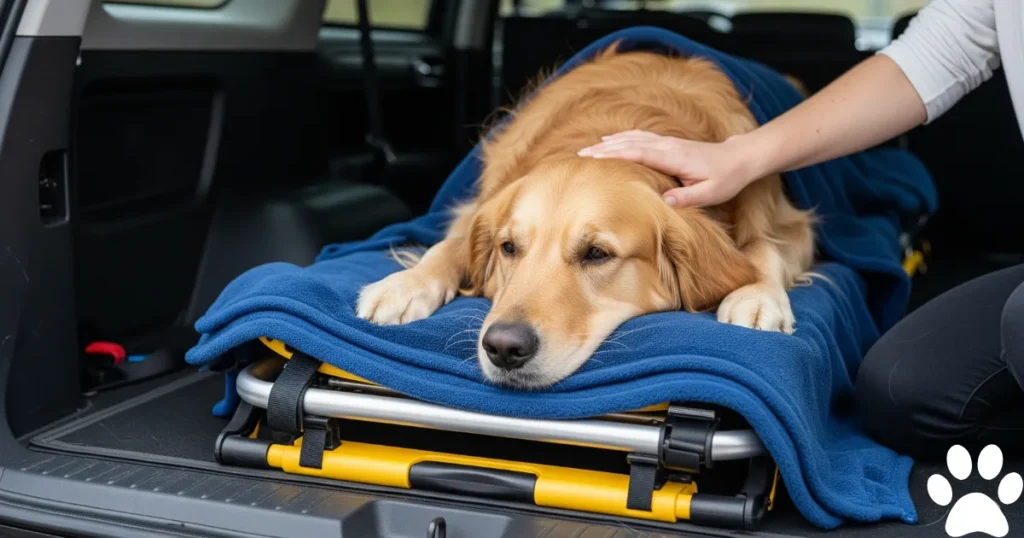
Immediate First Aid Steps for Golden Retriever Owners
The priority when discovering a dog’s stomach hard emergency involves contacting the nearest veterinary emergency clinic immediately. Time is critical in GDV cases, and calling ahead allows the veterinary team to prepare for the dog’s arrival. Owners should clearly communicate their observations about stomach distension, behavioral changes, and the timeline of symptom development, including whether this started as my dogs stomach is hard but acting normal.
While preparing for transport, Golden Retriever owners must avoid certain actions that could worsen the condition. Never attempt to induce vomiting in a dog with suspected bloat, as this can increase stomach pressure and potentially complete a partial stomach twist. Similarly, avoid giving food, water, or any medications unless specifically directed by veterinary personnel.
Proper transport positioning helps minimize discomfort and prevents complications during the journey to veterinary care. Golden Retrievers with distended belly conditions should be kept as calm and still as possible. Some dogs find relief lying on their side, while others prefer to remain standing or sitting. Allow the dog to choose the most comfortable position while ensuring safe vehicle transport.
Veterinary Treatment Options and Prognosis
Professional treatment for twisted stomach in dogs typically requires emergency surgery to correct the stomach position and assess tissue viability. The procedure, called gastropexy, involves untwisting the stomach and permanently anchoring it to prevent future rotation. Speed of treatment significantly influences outcomes, with dogs receiving surgery within 6 hours having much better survival rates.
Initial stabilization may include intravenous fluids, pain management, and stomach decompression through a tube passed into the stomach. This decompression can provide temporary relief but doesn’t address the underlying twisted stomach condition in dogs. Emergency surgery remains the definitive treatment for GDV in dogs.
Recovery prognosis depends on several factors, including how quickly treatment began, the degree of tissue damage, and the dog’s overall health status. Golden Retrievers receiving prompt treatment often recover completely, though they require careful monitoring during the healing process. Some dogs may experience complications like irregular heart rhythms or gastric ulcers, but most return to normal activity levels within several weeks.
Living with a Golden Retriever Prone to Stomach Issues
Golden Retrievers with a history of stomach problems or high risk factors require ongoing management to prevent future episodes and maintain optimal health. Understanding long-term care strategies helps owners provide the best possible quality of life while minimizing the risk of serious complications.
Long-term Management Strategies
Dogs who have experienced Golden Retriever stomach issues may benefit from permanent dietary and lifestyle modifications. Continuing with smaller, more frequent meals throughout their lifetime helps prevent the rapid stomach filling that can trigger repeat episodes. Many veterinarians recommend maintaining these feeding practices even after successful treatment.
Regular monitoring becomes a crucial part of ongoing care for Golden Retrievers prone to dogs stomach hard conditions. Owners should become familiar with their pet’s normal abdominal feel and appearance, checking regularly for changes. Weekly weight monitoring can help detect problems early, as sudden weight changes may indicate developing issues.
Environmental management includes maintaining consistent routines, minimizing stress, and continuing exercise restrictions around meal times. Some Golden Retrievers benefit from probiotics or digestive enzymes to support optimal gastrointestinal health, though these supplements should be used under veterinary guidance.
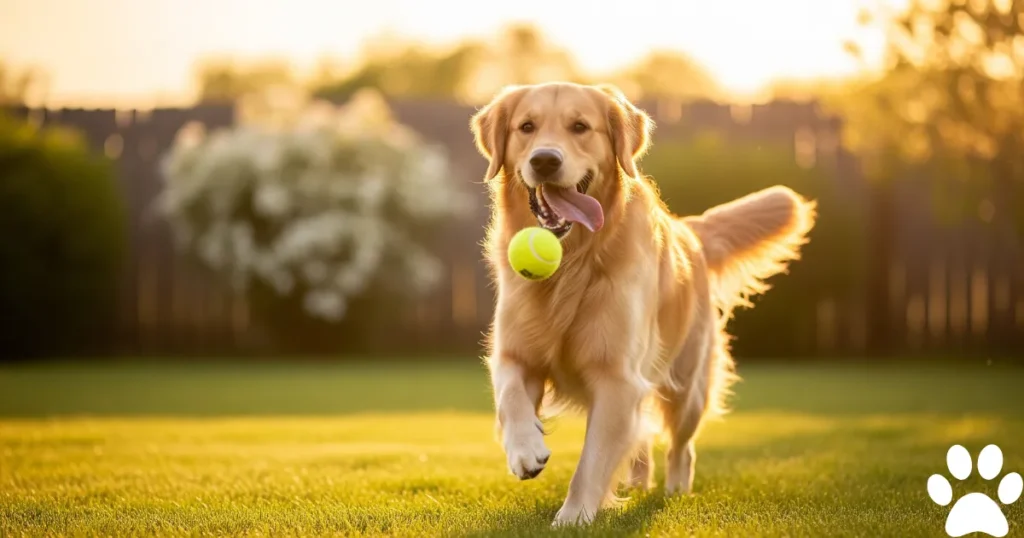
When to Consult Your Veterinarian About a Hard Dog’s Stomach
Establishing clear guidelines for when to seek veterinary care helps Golden Retriever owners make appropriate decisions about their pet’s health. Any recurrence of dogs stomach hard symptoms should prompt immediate veterinary consultation, even if the dog appears otherwise normal. The question why is my dogs stomach hard should never be ignored, particularly in breeds prone to Bloat.
Regular veterinary checkups become even more important for Golden Retrievers with a history of stomach issues. These visits allow for early detection of developing problems and adjustment of prevention strategies based on the dog’s changing needs. Veterinarians can assess risk factors and recommend modifications to diet, exercise, or medications as needed.
Emergency consultation is warranted whenever a dog tummy hard condition is accompanied by behavioral changes, inability to vomit despite trying, excessive drooling, or signs of pain. Golden Retriever owners should trust their instincts – if something seems wrong, seeking professional evaluation is always the safest choice, especially when the initial observation of dogs stomach hard persists or worsens.
Why is my dogs stomach hard after eating?
A dogs stomach hard condition after eating is often normal if it occurs immediately following meals and gradually softens within 2-3 hours. However, if the hardness persists, increases in severity, or is accompanied by symptoms like restlessness, drooling, or attempts to vomit, it could indicate a serious condition like GDV in dogs requiring immediate veterinary attention.
What should I do if my dogs stomach is hard but acting normal?
When my dogs stomach is hard but acting normal, monitor your Golden Retriever closely for any changes in behavior, appetite, or comfort level. While this may represent early-stage bloat, continue watching for progressive symptoms like restlessness, inability to vomit, or increased abdominal distension. If the hardness persists beyond 2-3 hours or any concerning symptoms develop, contact your veterinarian immediately.
How can I tell if my dog tummy hard is an emergency?
A dog tummy hard becomes an emergency when accompanied by unsuccessful attempts to vomit, excessive drooling, extreme restlessness, pale gums, rapid breathing, or a distended abdomen that appears barrel-shaped. These signs indicate potential GDV in dogs, which requires immediate emergency veterinary treatment to prevent fatal complications.
Can I prevent my Golden Retriever from getting bloat?
While you can not completely eliminate bloat risk, several strategies significantly reduce the likelihood of dogs stomach hard emergencies. Feed smaller, more frequent meals, avoid vigorous exercise for 1-2 hours after eating, use ground-level feeding bowls, and consider prophylactic gastropexy for high-risk dogs. Managing stress and maintaining consistent feeding routines also help prevent Golden Retriever stomach issues.
How quickly does bloat progress in Golden Retrievers?
Bloat can progress rapidly, often becoming life-threatening within 4-6 hours of onset. The timeline typically begins with subtle signs where owners might notice my dogs stomach is hard but acting normal, then progresses to obvious distress with a distended abdomen appearance, and finally to shock symptoms. This rapid progression makes early recognition and immediate veterinary care crucial for successful treatment.
What is the difference between bloat and GDV in dogs?
Bloat can progress rapidly, often becoming life-threatening within 4-6 hours of onset. The timeline typically begins with subtle signs where owners might notice my dogs stomach is hard but acting normal, then progresses to obvious distress with a distended abdomen appearance, and finally to shock symptoms. This rapid progression makes early recognition and immediate veterinary care crucial for successful treatment.
Should I try to make my dog vomit if their stomach is hard?
Never attempt to induce vomiting when you notice dog tummy hard symptoms. If the stomach has twisted (GDV), forcing vomiting can worsen the condition and cause additional complications. Instead, contact your veterinarian immediately and transport your Golden Retriever to emergency care while keeping them as calm and comfortable as possible during the journey.
Are Golden Retrievers more prone to stomach issues than other breeds?
Yes, Golden Retrievers have increased susceptibility to bloat and GDV due to their large size, deep chest structure, and genetic predisposition. Understanding why is my dogs stomach hard becomes particularly important for Golden Retriever owners, as this breed faces higher risk compared to smaller dogs. However, with proper prevention strategies and vigilant monitoring, most Golden Retrievers live healthy lives without experiencing these serious stomach issues.
Final Thoughts: Protecting Your Golden Retriever from Serious Stomach Issues
Understanding when a dogs stomach hard condition represents a medical emergency empowers Golden Retriever owners to provide the best possible care for their beloved companions. From recognizing early warning signs to implementing comprehensive prevention strategies, knowledge serves as the first line of defense against these potentially life-threatening conditions.
The key to successful Golden Retriever health management lies in balancing vigilance with practical daily care. While GDV in dogs represents a serious risk for the breed, most Golden Retrievers live long, healthy lives without experiencing these complications. By implementing appropriate feeding strategies, exercise management, and regular veterinary care, owners can significantly reduce their pet’s risk while maintaining the active, joyful lifestyle that makes Golden Retrievers such wonderful companions.
Remember that prompt recognition and immediate veterinary care provide the best outcomes when stomach emergencies do occur. Golden Retriever owners who understand the signs, symptoms, and proper response to abdominal emergencies are well-equipped to protect their pets and ensure many more years of happy, healthy companionship.
Dr. Nabeel A.
Hi, I’m Dr. Nabeel Akram – a farm management professional by trade and a passionate Golden Retriever enthusiast at heart. With years of experience in animal science and livestock care, I’ve built a career around understanding animals—how they live, thrive, and bring value to our lives. This blog is a personal project born from that same passion, focusing on one of the most loyal and lovable breeds out there: the Golden Retriever. Whether I’m managing farm operations or sharing insights on canine health, behavior, and care, it all ties back to one core belief—animals deserve thoughtful, informed, and compassionate attention. Welcome to a space where professional expertise meets genuine love for dogs.
Facebook |
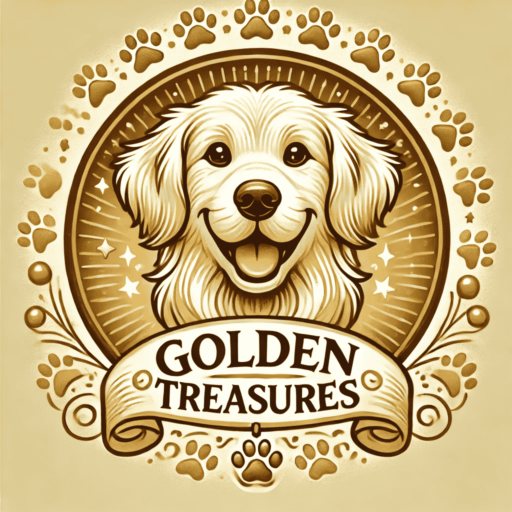
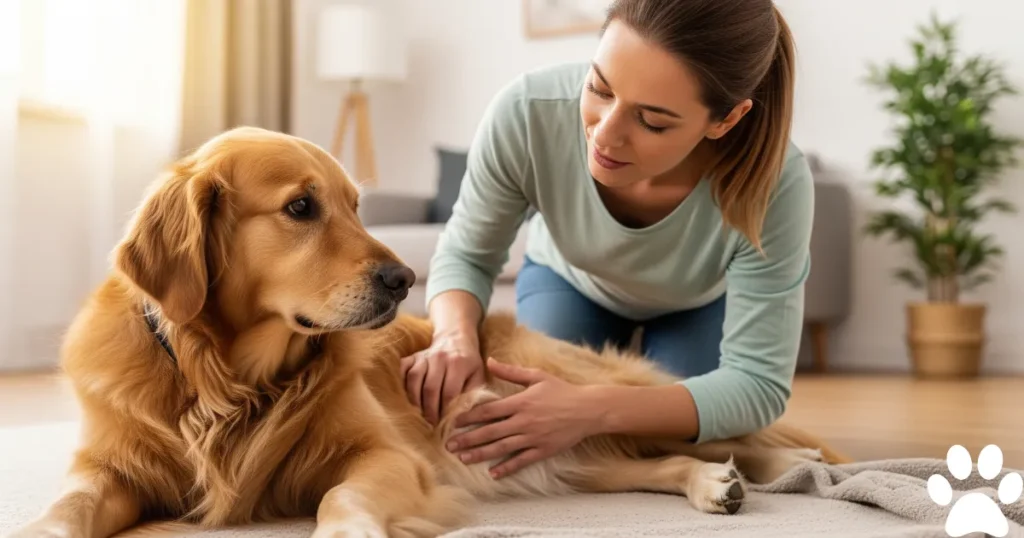
Links will be automatically removed from comments.